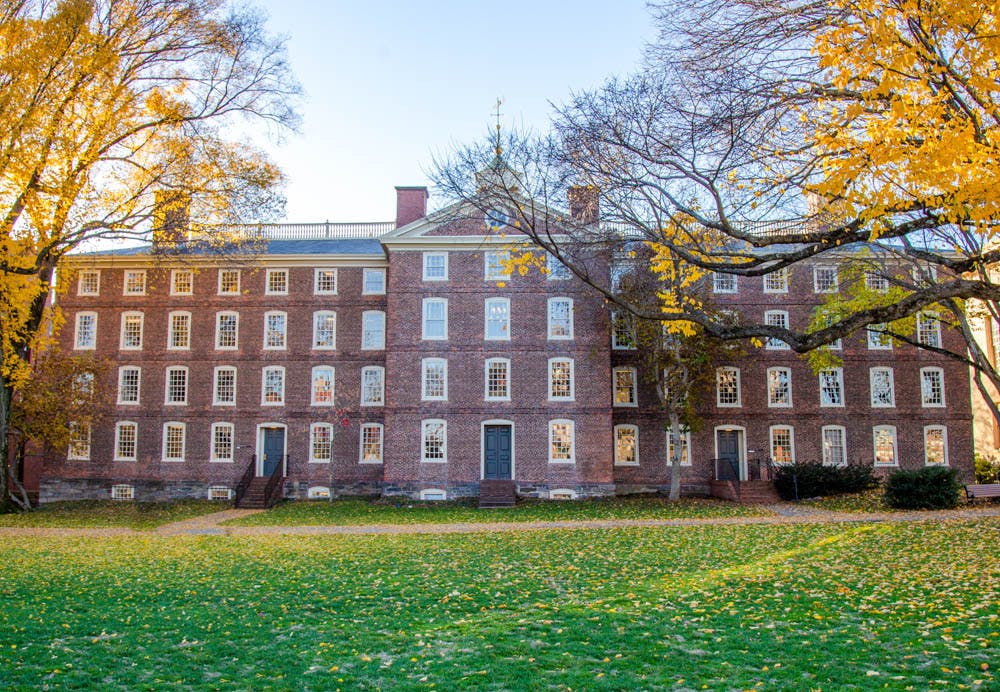The University officially received re-accreditation from the New England Commission of Higher Education last month, wrote President Christina Paxson P’19 in a Today@Brown announcement Oct. 31. The process included an evaluation by an outside team of accreditors last spring and an extensive self-study led by Deputy Provost Joseph Meisel.
In a summation of the University’s strengths and weaknesses noted in the final report, evaluators commended Brown’s undergraduate education as a whole, the Brown Promise campaign and diversity initiatives on campus. But they saw room for improvement in the “high rate of tenure” among faculty, lack of focus on graduate programs, lack of contingency plans in the management of financial resources and inadequate transparency and collaboration between University administration and the Graduate School.
Meisel said he was not particularly surprised by any of the recommendations offered by the accreditation team, especially because he and Paxson frequently met with the committee throughout the process.
Paxson told The Herald that she and other administrators have yet to make any concrete decisions about how they will respond to the criticism. “We do have to respond to this, the question is how,” she said.
Paxson acknowledged that “the report had constructive criticisms in a number of areas.” The accreditors suggested “improving the quality of our PhD programs, making them even stronger than they are now,” Paxson said. “That’s something that I think is … aligned with what we’re doing anyway — we care about building very strong doctoral programs.”
To address these concerns, the administration must consider diverse viewpoints within the community, Paxson said. “It’s important for a discussion like this, which is actually quite sensitive, to make sure we get a lot of buy-in from the community and listen to a lot of voices before we dive in.”
The University undergoes the same re-accreditation process every 10 years. “The effort offers public assurance about the quality of our academic programs,” Paxson wrote in the Today@Brown announcement. “Accreditation is critical for advancing the goal, both at Brown and across higher education, of ensuring accountability and transparency.” Accreditation is a voluntary system, Meisel added.
For the external evaluation process, the accreditation team met with representative members from various University departments, such as Academic Affairs, Campus Life and the Budget and Finance Committees, according to the report. The team later met with other senior administrators, including Paxson, Meisel, Dean of the Faculty Kevin McLaughlin and former Dean of the College Maud Mandel. Lastly, the accreditors had “three open forums — one each with faculty, students and staff,” and “held meetings with a small group of tenure-track assistant professors, as well as a larger group of non-tenure-track lecturers and faculty,” according to the report.
The NECHE establishes a set of nine accreditation standards for member universities to meet, under categories such as “Mission and Purposes,” “Planning and Evaluation” and “Organization and Governance,” Meisel said.
Meisel said that “not every standard applies to (the University), because they look at a broad spectrum of institutions.” For example, the open curriculum does not fit into the standard of “General Education,” and therefore, the University must be evaluated in the context of its unique educational program.
The self-study — which culminated in winter 2016 — is the “mechanism through which the University responds to” these nine standards, Meisel said.
The process of self-evaluation forced Meisel and other coordinators to ask themselves, “Do we have the resources, the organization and the accountability mechanisms that allow to us to successfully live up to the mission that we say we have?” Meisel said.
During the self-study, multiple committees were created to address each NECHE standard. The self-study team was also able to make use of existing committees on campus to tackle specific standards. For example, the University Resources team, which already handles campus finances, was responsible for the “Finance” category.
The members of the external evaluation team were comprised of 11 individuals from institutions similar to the University, which helps them understand how the University functions, Meisel said. These individuals “understand the kind of students we have, (the) kind of issues that institutions like Brown have,” he added.
According to the final report, the evaluators came from New York University, Colby College, Princeton, University of Chicago, Tufts University, Dartmouth, Harvard, Trinity College, Cornell and Massachusetts Institute of Technology. The committee was chaired by NYU president Andrew Hamilton.
— With additional reporting by Allie Reed





